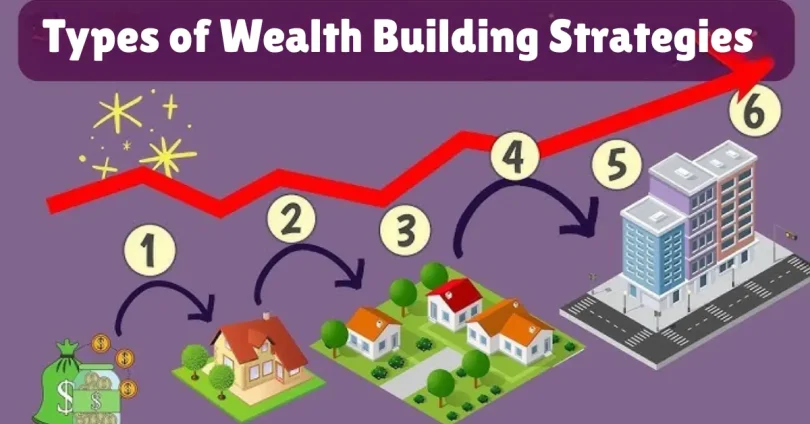We’ve all imagined what it would be like to never worry about money again—whether that means enjoying early retirement on a beach, sending your kids to the best schools without stress, or simply having the freedom to say “yes” to experiences instead of calculating every expense. But here’s the truth: financial freedom doesn’t come from luck or winning the lottery. It’s the result of smart decisions and applying the right types of wealth building strategies over time.
Think of wealth building like planting a garden. You don’t plant seeds today and expect a forest tomorrow. It takes watering, patience, and nurturing before the results start to show. Similarly, building wealth requires consistency, planning, and resilience.
The exciting part? You don’t have to be a math whiz or a Wall Street pro to begin. By learning the main strategies, choosing the ones that align with your lifestyle, and sticking with them, you’ll be setting yourself up for lasting financial growth.
Now, let’s explore the different types of wealth building strategies in a way that feels simple, actionable, and achievable.
1. Savings-Based Wealth Building

Think of savings as the foundation of a house—without it, nothing stands strong. Before you dive into high-risk investments or start businesses, you need a stable safety net.
- High-Yield Savings Accounts (HYSAs): These accounts earn more interest than traditional savings accounts, helping your money grow quietly while remaining accessible. Even though interest rates may not make you rich overnight, they’re far better than letting money sit idle.
- Emergency Funds: Life is unpredictable—car breakdowns, medical bills, or sudden job loss can derail your finances. Having 3–6 months of living expenses in an emergency fund ensures you won’t have to liquidate investments or go into debt when trouble strikes.
- Automated Savings: “Out of sight, out of mind” works beautifully here. Automating transfers into savings each month guarantees consistency without relying on willpower.
Why it works: This strategy builds financial discipline and provides a safety cushion, giving you confidence to take bigger financial risks later.
2. Investment-Based Wealth Building
Once savings are in place, it’s time to put your money to work. Investments accelerate wealth because they grow through compound interest—your earnings generate more earnings.
- Stock Market Investing: By owning stocks, you own pieces of companies. Whether it’s individual stocks, index funds, or ETFs, the stock market historically delivers strong long-term returns.
- Real Estate Investments: Buying property isn’t just about owning a home. Rental properties create cash flow, while property values typically rise over time. Real estate also offers leverage opportunities—you can use borrowed money to own appreciating assets.
- Bonds & Fixed-Income Assets: Safer than stocks, bonds provide predictable interest payments. They balance your portfolio and protect against volatility.
- Retirement Accounts (401k, IRA): These accounts not only grow your wealth but also come with tax advantages. Contributions reduce taxable income now, while investments grow tax-deferred (or tax-free in Roth accounts).
Why it works: Compound growth multiplies your wealth significantly over decades, making this one of the most powerful types of wealth building strategies.
You may also like to read this:
How To Invest In Stocks For Beginners And Grow Your Money
Why Diversification Is Important In Investing Explained
7 Best Smart Investing Apps and Platforms To Use In 2025
Active Investing Vs Passive Investing: Which Strategy Wins?
What Is Wealth Building? Guide To Financial Freedom
3. Entrepreneurship and Business Ownership
Starting a business is one of the boldest ways to build wealth—and it’s also the strategy behind many self-made millionaires.
- Small Businesses: Local shops, e-commerce stores, or service-based businesses can generate consistent cash flow.
- Scalable Startups: Technology, apps, or service models with global reach have the potential to grow exponentially.
- Side Hustles: Freelancing, coaching, or selling digital products can supplement your income while giving you entrepreneurial experience.
Why it works: Businesses don’t just provide income—they build equity. As your company grows, so does its value, creating wealth beyond what a job salary can achieve.
4. Passive Income Strategies

Imagine waking up in the morning to find money deposited in your account while you slept. That’s the beauty of passive income.
- Dividend Stocks: When you own shares of dividend-paying companies, you receive regular payouts—without selling your investments.
- Rental Properties: With the right tenants, your property generates steady income while appreciating in value.
- Royalties: Creators earn money long after publishing a book, song, or online course.
- Affiliate Marketing: By promoting products online, you earn commissions on each sale, often with minimal ongoing effort.
Why it works: Passive income reduces your dependence on trading time for money. The more streams you create, the closer you get to financial independence.
5. Debt Management and Leverage
Wealth building isn’t just about making money—it’s also about keeping more of what you earn by managing debt wisely.
- Good Debt: Loans used to finance education, real estate, or businesses can help you build long-term wealth. They’re considered “good” because they increase your earning potential or asset value.
- Bad Debt: Credit card balances, payday loans, or high-interest personal loans drag you down. They drain your income and create financial stress.
- Leverage: Using borrowed money smartly—especially in real estate or business—can amplify your gains. For example, financing a property allows you to control a large asset with a relatively small initial investment.
Why it works: Eliminating toxic debt frees up money for investments, while good debt and leverage can accelerate wealth growth.
6. Lifestyle and Mindset Strategies
Even with the best financial tools, wealth won’t last without the right habits and mindset.
- Living Below Your Means: Wealthy people often avoid overspending, no matter how much they earn. By cutting unnecessary expenses, you create more room for savings and investments.
- Financial Education: Money management is a lifelong learning process. Books, podcasts, and courses sharpen your skills and help you make informed decisions.
- Networking: Surrounding yourself with successful, wealth-minded individuals opens opportunities for investments, mentorship, and collaboration.
Why it works: Money habits and mindset determine whether you keep wealth or lose it. Self-control and education ensure steady progress.
7. Generational Wealth Planning
True wealth is about more than your lifetime—it’s about creating a legacy. Generational wealth ensures your family benefits from your hard work for decades to come.
- Estate Planning & Trusts: A will, trust, or estate plan ensures your assets are passed on smoothly while minimizing taxes.
- Insurance: Life and health insurance protect your family from financial devastation when unexpected events occur.
- Teaching Kids About Money: Passing on financial literacy is as valuable as passing on assets. Children who understand money management are more likely to grow wealth instead of losing it.
Why it works: Instead of wealth disappearing with you, it continues to grow and support future generations.
Comparing the Types of Wealth Building Strategies
Now that we’ve broken down the types of wealth building strategies, you might be wondering: Which one should I focus on first? The truth is, you don’t have to pick just one. Most financially successful people combine multiple strategies to balance risk, reward, and security.
Here’s a simple comparison to help you see how each fits into your financial journey:
| Strategy Type | Risk Level | Time Horizon | Effort Needed | Best For |
| Savings-Based | Very Low | Short-term (1–3 years) | Low (automated) | Beginners, emergency planning |
| Investment-Based | Medium to High | Long-term (5–30 years) | Moderate (research + monitoring) | Building wealth for retirement or financial independence |
| Entrepreneurship & Business | High | Variable (depends on business) | Very High | Ambitious individuals ready to take risks |
| Passive Income | Low to Medium | Medium to Long-term | Moderate upfront, low ongoing | People wanting steady cash flow beyond salary |
| Debt Management & Leverage | Varies (good vs. bad debt) | Short + Long-term | Moderate | Anyone carrying debt or investing in real estate/business |
| Lifestyle & Mindset | Very Low | Lifelong | Daily discipline | Everyone building wealth |
| Generational Wealth Planning | Low to Medium | Lifelong + beyond | Moderate (legal + planning) | Families wanting to protect and transfer wealth |
How to Combine Wealth Building Strategies
The best approach isn’t choosing one—it’s creating a personal wealth roadmap. Here’s a step-by-step flow many people follow:
- Start with savings → Build your emergency fund so you’re financially safe.
- Begin investing → Even small amounts in stocks, ETFs, or retirement accounts grow massively over time.
- Pay off bad debt → Clear high-interest loans to free up cash.
- Explore side hustles or businesses → Add income streams that could become full-scale businesses.
- Build passive income → Use investments, rental properties, or digital products to earn without constant work.
- Adopt a wealthy mindset → Spend wisely, keep learning, and surround yourself with success-oriented people.
- Plan for generational wealth → Once stable, secure your family’s financial future with trusts, insurance, and education.
Common Mistakes to Avoid
When working with these types of wealth building strategies, watch out for these pitfalls:
- Starting with risky investments before saving → Without a safety net, you could be forced to sell assets during emergencies.
- Confusing good debt with bad debt → Not all borrowing is harmful—leverage can be powerful if used wisely.
- Chasing quick wins → Wealth is a marathon, not a sprint. Patience matters.
- Lifestyle creep → As income rises, so do expenses. Staying disciplined ensures more money goes into wealth building.
- Ignoring financial literacy → Strategies work best when you truly understand them.
Final Thoughts
Wealth isn’t about luck—it’s about structure, discipline, and smart choices. The different types of wealth building strategies—from savings and investments to entrepreneurship, passive income, and generational planning—give you the tools to create not just financial stability, but true financial freedom.
Start small, be consistent, and keep layering strategies as your financial confidence grows. Remember, you don’t have to become rich overnight—you just need to keep moving forward. You’re not just earning money; you’re building a system that works for you today, tomorrow, and for generations to come.
FAQs
Q1. What are the main types of wealth building strategies?
The main types include savings-based strategies, investment-based strategies, entrepreneurship and business ownership, passive income streams, debt management and leverage, lifestyle and mindset habits, and generational wealth planning. Each plays a different role in helping you grow and protect your money.
Q2. Which wealth building strategy should I start with?
Most experts recommend starting with savings-based wealth building. Creating an emergency fund and building financial discipline gives you a safety net, so you’re ready to explore higher-risk strategies like investing or business ownership later.
Q3. Is investing the best way to build wealth?
Investing is one of the most powerful types of wealth building strategies because it uses compound growth. However, it works best when combined with other strategies such as saving, controlling debt, and building passive income streams.
Q4. How important is debt management in wealth building?
Very important. Bad debt (like high-interest credit cards) drains your wealth, while good debt (like mortgages or business loans) can help you grow assets. Managing debt wisely frees up cash flow for investments and accelerates wealth building.
Q5. Can passive income really make you wealthy?
Yes, but it usually requires time and effort upfront. Passive income from rental properties, dividend stocks, royalties, or digital products allows you to earn money continuously without trading time for every dollar. Over time, multiple passive income streams can lead to financial independence.




